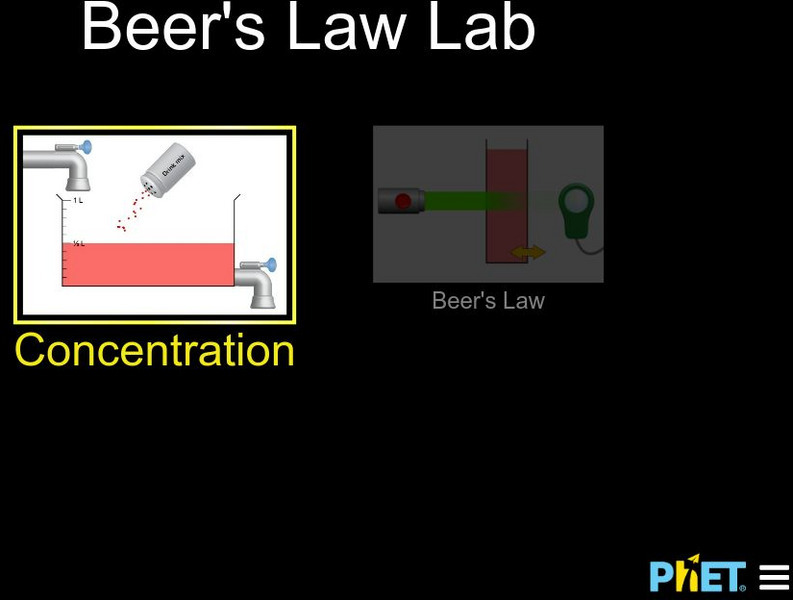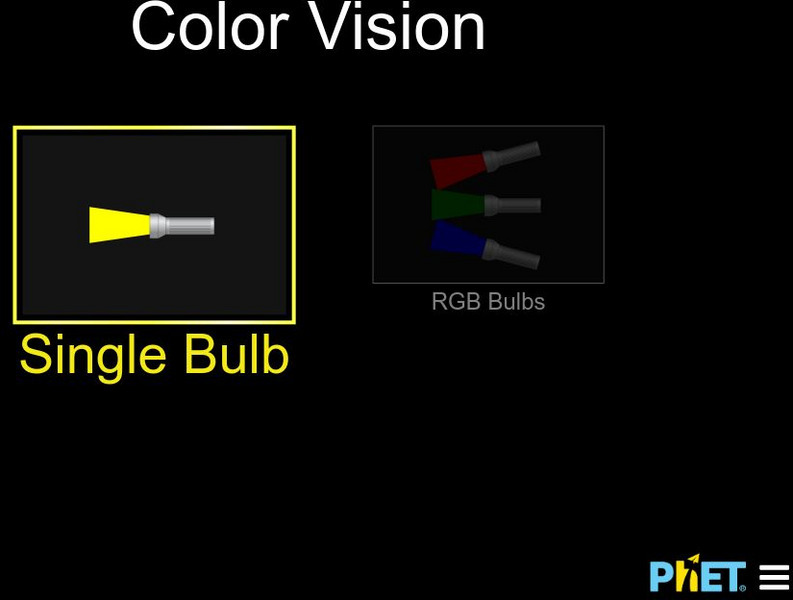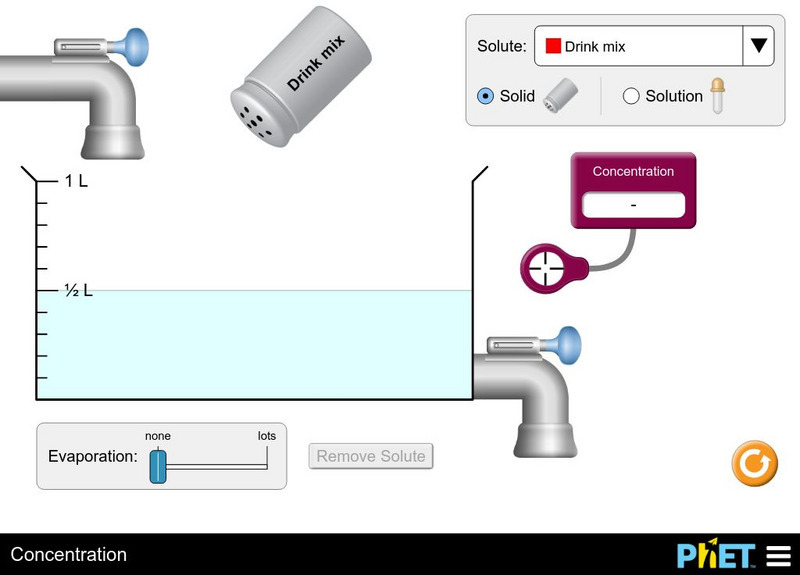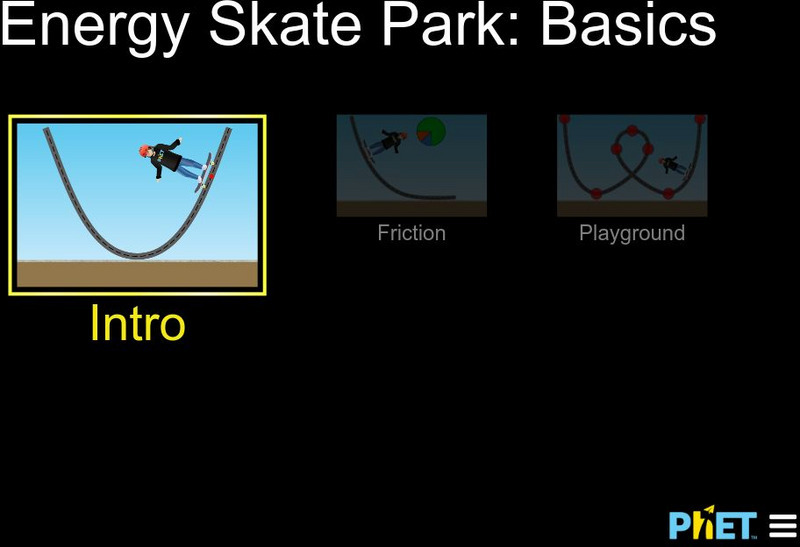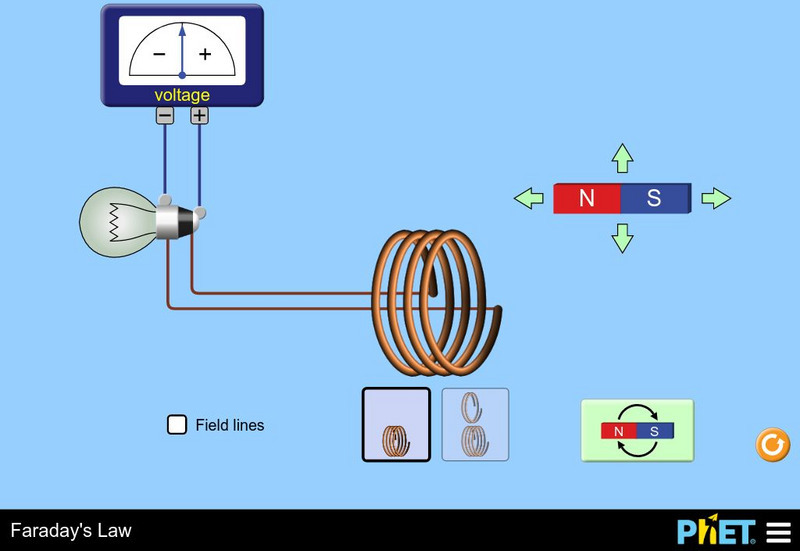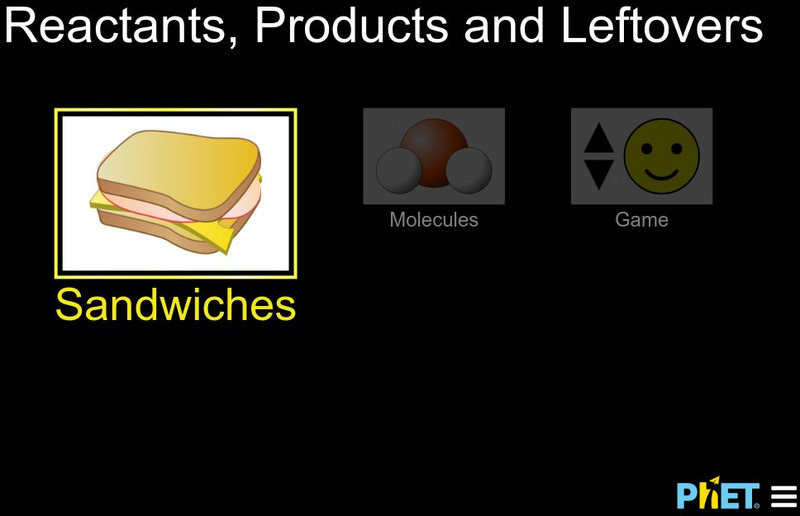University of Colorado
University of Colorado: Ph Et Interactive Simulations: Balancing Chemical Equations
How does one know if a chemical equation is balanced? What can be changed to balance an equation? Play a game to test ideas!
University of Colorado
University of Colorado: Ph Et Interactive Simulations: Balloons and Static Electricity
Investigate static electricity by rubbing a balloon on a sweater and observing what happens. Try it with two balloons. See the positive and negative charges that illustrate why there is attraction or repulsion between the balloons, the...
University of Colorado
University of Colorado: Ph Et Interactive Simulations: Beer's Law Lab
"The thicker the glass, the darker the brew, the less the light that passes through." Make colorful concentrated and dilute solutions and explore how much light they absorb and transmit using a virtual spectrophotometer!
University of Colorado
University of Colorado: Ph Et Interactive Simulations: Build an Atom
Build an atom out of protons, neutrons, and electrons, and see how the element, charge, and mass change. Then play a game to test your ideas!
University of Colorado
University of Colorado: Ph Et Interactive Simulations: Color Vision
Make a whole rainbow by mixing red, green, and blue light. Change the wavelength of a monochromatic beam or filter white light. View the light as a solid beam, or see the individual photons.
University of Colorado
University of Colorado: Ph Et Interactive Simulations: Concentration Simulation
Students will explore changing the concentration of solutions by adding different solutes and adjusting the amount of water.
University of Colorado
University of Colorado: Ph Et Interactive Simulations: Concentration
Watch your solution change color as you mix chemicals with water. Then check molarity with the concentration meter. What are all the ways you can change the concentration of your solution? Switch solutes to compare different chemicals...
University of Colorado
University of Colorado: Ph Et Interactive Simulations: Energy Skate Park
Explore kinetic, potential, and thermal energy as you send a skateboarder along several pre-built tracks, then design your own. Charts and graphs show the distribution of the different forms of energy, illustrating how the total energy...
University of Colorado
University of Colorado: Ph Et Interactive Simulations: Energy Skate Park
Learn about conservation of energy with a skater dude. Build tracks, ramps, and jumps for the skater and view the kinetic energy, potential energy and friction as he moves.
University of Colorado
University of Colorado: Ph Et Interactive Simulations: Faraday's Law
Investigate Faraday's law and how a changing magnetic flux can produce a flow of electricity!
University of Colorado
University of Colorado: Ph Et Interactive Simulations: Forces and Motion: Basics
Explore the forces at work when pulling against a cart, and pushing a refrigerator, crate, or person. Create an applied force and see how it makes objects move. Change friction and see how it affects the motion of objects.
University of Colorado
University of Colorado: Ph Et Interactive Simulations: Friction
Learn how friction causes a material to heat up and melt. What happens on an atomic level when you rub two objects together?
University of Colorado
University of Colorado: Ph Et Interactive Simulations: Gravity Force Lab
Manipulate the mass and distance of two objects to see how these properties change the gravity force.
University of Colorado
University of Colorado: Ph Et Interactive Simulations: Molarity
What determines the concentration of a solution? Learn about the relationships between moles, liters, and molarity by adjusting the amount of solute and solution volume. Change solutes to compare different chemical compounds in water.
University of Colorado
University of Colorado: Ph Et Interactive Simulations: Basics
Test the pH of everyday liquids such as coffee, spit, and soap to determine whether each is acidic, basic, or neutral. Investigate how adding more of a liquid or diluting with water affects pH.
University of Colorado
University of Colorado: Ph Et Interactive Simulations: Reactants, Products, Leftovers
Explore the analogy of sandwich making with several ingredients and see if anything is left over. Then do the same thing with reactants in a chemical reaction, to see how many different products can be made. Afterwards, play a game with...
University of Colorado
University of Colorado: Ph Et Interactive Simulations: Wave on a String
Students can observe the properties of a wave with different variables. Students can experiment with the type of end, damping factor, and tension in the string. Possible teacher lesson plans are included at the bottom of the page.
University of Colorado
University of Colorado: Natural Hazards Center: Natural Hazards Observer
A publication of the Natural Hazards Center focusing on natural disaster research. Specific information available for numerous subtopics.
University of Colorado
University of Colorado: Ph Et Interactive Simulations: Bending Light
Explore bending of light between two media with different indices of refraction. See how changing from air to water to glass changes the bending angle. Play with prisms of different shapes and make rainbows.
University of Colorado
University of Colorado: Ph Et Interactive Simulations: Hooke's Law
Stretch and compress springs to explore the relationships between force, spring constant, displacement, and potential energy. Investigate what happens when two springs are connected in series and parallel.
University of Colorado
University of Colorado: Ph Et Interactive Simulations: Molecules and Light
Do you ever wonder how a greenhouse gas affects the climate, or why the ozone layer is important? Use the sim to explore how light interacts with molecules in our atmosphere.
University of Colorado
University of Colorado: Ph Et Interactive Simulations: Calculus Grapher
Draw a graph of any function and see graphs of its derivative and integral. Don't forget to use the magnify/demagnify controls on the y-axis to adjust the scale.
University of Colorado
University of Colorado: Physics 2000: Electromagnetic Waves
Using a student-teacher dialogue format, this page discusses the nature of light as an electromagnetic wave and the electromagnetic spectrum.
University of Colorado
University of Colorado: Physics 2000: Einstein's Legacy: X Rays
An explanation of how X-ray machines work. An online activity in which a comparison is made between how the hand would be viewed with X-ray versus with visible light. An additional page explains the use of X-rays in CAT scan devices.


